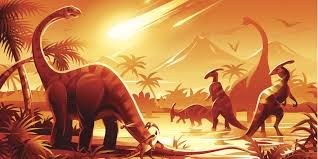Could the dinosaurs have survived?
Published: 18th May 2017
In a new BBC, Two documentary scientist’s who have been exploring the crater associated with the extinction of the dinosaurs will share some of their new findings.
The asteroid, which impacted the earth 66 million years ago and landed in the area, we now call the Gulf of Mexico, caused a crater 111miles wide and 20 miles deep. From their research and findings, scientists have found that evidence suggests that the area of the asteroid impact could not have hit at a worse place or time.

This is due to the rich sulphur content within the rock. The impact of the asteroid would have vaporised the rock causing the sulphur to fill the air, block out the sun and cool the planet, causing an ice age and wiping out most life. Dinosaurs not killed by the sulphur would have had to avoid the molten rock from the sky and tsunamis, which would have killed out much of their food supply.
What is fascinating about these findings is that it suggests that it wasn’t the asteroid's size that killed the dinosaurs it was the precise location of the impact. As Ben Garrod presenter in this new documentary describes: "This is where we get to the great irony of the story – because, in the end, it wasn’t the size of the asteroid, the scale of blast, or even its global reach that made dinosaurs extinct – it was where the impact happened. Had the asteroid struck a few moments earlier or later, rather than hitting shallow coastal waters it might have hit Deep Ocean.”
Had the impact been later or earlier the asteroid would have landed into the Atlantic or Pacific Sea. This would of lead to seawater being vaporised and causing much less harm and lead to a very different world today. One, which could have seen dinosaur’s survival.
Read more on this story here: http://www.bbc.co.uk/news/science-environment-39922998





.jpg?w=1140&h=320&zc=1)





